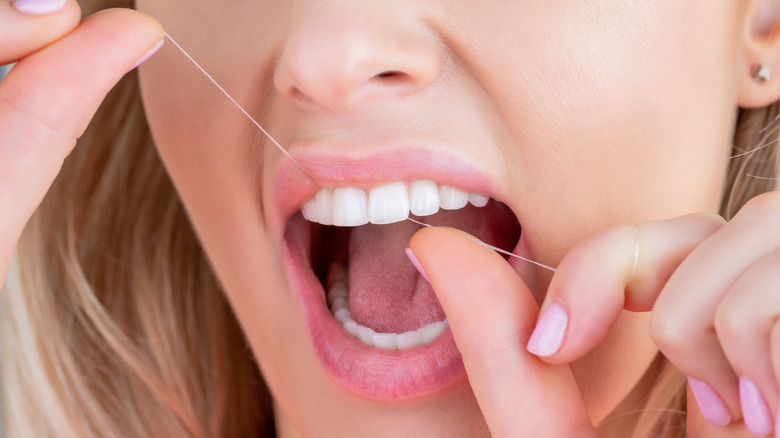Never Reuse Your Floss. Here's Why
While it's true that we reuse our toothbrushes and toothpaste, the same rule of thumb should not be applied to dental floss. Because daily flossing is crucial to our oral health, it should not be ignored. Although brushing our teeth is an effective way to safeguard against cavities and dental decay, dental floss steps up in the areas where a toothbrush falls short — primarily between teeth (via Humana). Plaque and food residue that becomes lodged in the crevices between each tooth cannot be fully dislodged by a toothbrush alone.
Flossing on a regular basis can prevent the buildup of these particles, which can become potentially harmful down the road and lead to further oral health complications. Although dental floss is helpful, it is most effective when used properly. Whether made from dental ribbon, nylon, or plastic, all dental floss is intended to be a single-use product.
Each time you reuse floss you are introducing more bacteria into your mouth
Each time you reuse your dental floss, that strand accumulates more potentially harmful bacteria (via Dental Care Report). The time and care you put into removing all of that initial bacteria becomes void, as you are essentially putting it all right back into your mouth. As floss undergoes repeated use, the material itself begins to break down, leaving each flossing session less effective than the last.
In addition, you are likely exposing your mouth to new additional bacteria each time you floss. From the bathtub to the toilet, your home bathroom is a hot spot for germs. According to Soakology, on average, the surface of a bathroom countertop can harbor as much as 452 bacteria per square inch. Therefore, leaving your previously used dental floss in the bathroom almost guarantees that this bacteria will find its way onto your strand.
Although the urge to recycle products is tempting, it's best to be one-and-done when it comes to dental floss.


